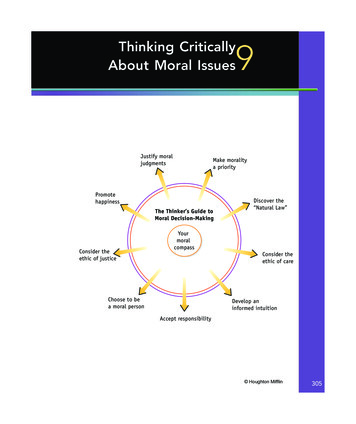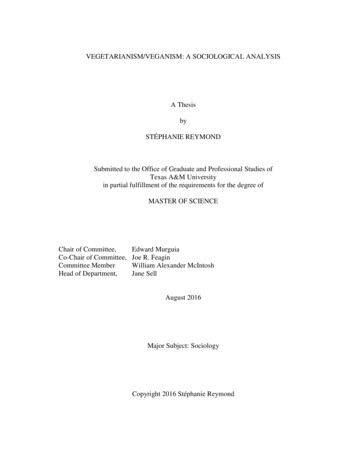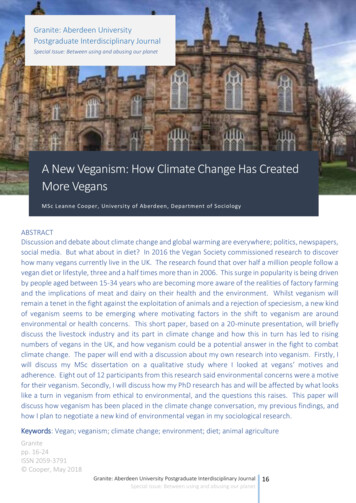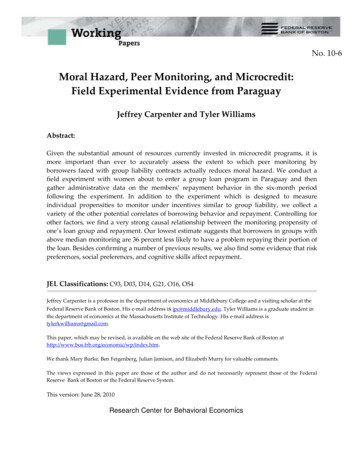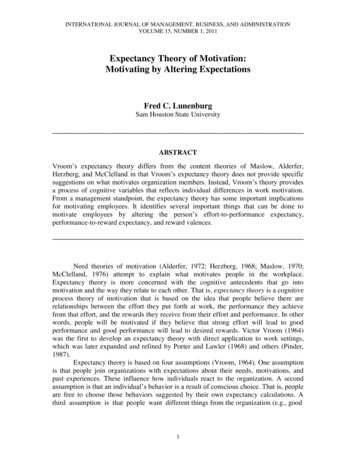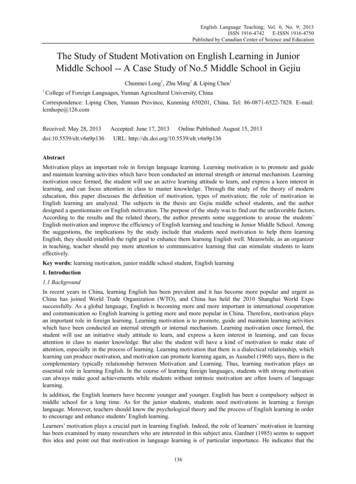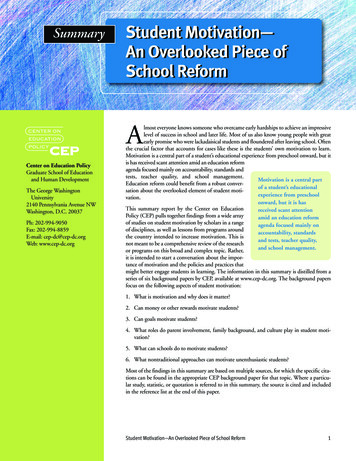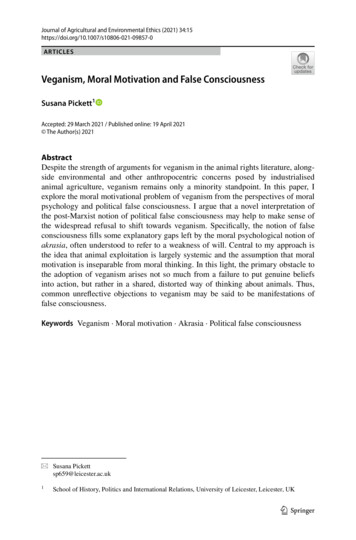
Transcription
Journal of Agricultural and Environmental Ethics (2021) ICLESVeganism, Moral Motivation and False ConsciousnessSusana Pickett1Accepted: 29 March 2021 / Published online: 19 April 2021 The Author(s) 2021AbstractDespite the strength of arguments for veganism in the animal rights literature, alongside environmental and other anthropocentric concerns posed by industrialisedanimal agriculture, veganism remains only a minority standpoint. In this paper, Iexplore the moral motivational problem of veganism from the perspectives of moralpsychology and political false consciousness. I argue that a novel interpretation ofthe post-Marxist notion of political false consciousness may help to make sense ofthe widespread refusal to shift towards veganism. Specifically, the notion of falseconsciousness fills some explanatory gaps left by the moral psychological notion ofakrasia, often understood to refer to a weakness of will. Central to my approach isthe idea that animal exploitation is largely systemic and the assumption that moralmotivation is inseparable from moral thinking. In this light, the primary obstacle tothe adoption of veganism arises not so much from a failure to put genuine beliefsinto action, but rather in a shared, distorted way of thinking about animals. Thus,common unreflective objections to veganism may be said to be manifestations offalse consciousness.Keywords Veganism · Moral motivation · Akrasia · Political false consciousness* Susana Pickettsp659@leicester.ac.uk1School of History, Politics and International Relations, University of Leicester, Leicester, UK13Vol.:(0123456789)
15 Page 2 of 21S. PickettIntroductionWhy does the case for veganism often fail to convince? Insofar as it does swayopinion, why then does it fail to motivate large-scale social change? Whilst moraldisagreements are inevitable, the core case for veganism from the animal rights perspective – complemented as it is by environmental, social justice, and global healthconsiderations – is robust.1 Considering this jointly with commonly held moral principles, one might reasonably expect the percentage of vegans to be much higher, atleast in economically developed societies. On the other hand, apathy towards veganism prevails, and common objections to veganism often rest on rationalisations(Piazza 2015, p. 114). In this paper, I suggest that a failure to accept the moral statusof animals as required by veganism may itself constitute a failure of moral motivation (hereinafter referred to as motivation). Central to this position is the premise that moral thinking and motivation are inseparable, and thus thinking does notnecessarily precede motivation. If this is the case, then common excuses presentedagainst veganism express failures of motivation rather than intent, by which I meanthe motivation to think of animals as being recipients of moral consideration in amanner that conflicts with our social habits and received opinion.To narrow the scope of my opening questions, I examine the motivational problem from two radically opposing perspectives; namely akrasia and false consciousness. Akrasia – often known as ‘weakness of the will’ – is a failure of practicalreasoning whereby individuals act knowingly and willingly against their betterjudgement. This idea has already been developed by Aaltola (2016) to explain thewidespread reluctance to adopt veganism. Marxian false consciousness, by contrast,is traditionally understood as the social consciousness of an exploited class. It leadsindividuals to act – not fully knowingly or willingly, and thus not akratically – undera dominant ideology. This ideology may run contrary to one’s best interests, but Iargue that it can also taint one’s conception of the ‘greater’ good. I understand falseas applying to groups of individuals beyond social class, and argue that it is falseconsciousness, rather than akrasia, that is more likely to be a persistent conditionthat dampens motivation. As such, false consciousness may have greater explanatorypower than akrasia for the widespread refusal to shift towards veganism.This paper is divided into three sections. First, I offer a brief overview of themotivational difficulties associated with veganism, specifically the role of willpowerand typically presented rationalisations. Second, I give an overview of akrasia andthe structure of akratic action. Furthermore, I consider social factors which impactupon our moral thinking, serving to highlight that moral thinking is not reducible tosyllogistic-style reasoning. Shortcomings of the application of akrasia lead on to thefinal section on false consciousness, wherein I explore the persistency of dominantideologies and their impact upon moral thinking and motivation.1For a concise exposition of the cumulative case for veganism see Stephens (1994). For more recentarguments see Francione (2008), Huemer (2019) and Singer (2020).13
Veganism, Moral Motivation and False Consciousness Page 3 of 21 15The Vegan Motivational ProblemMoral motivation is typically conceived as the phenomenon of being motivated todo what one judges to be the right thing to do. Naturally, moral reasons can conflict with one’s self-interest and other reasons. In the animal ethics literature, careethicists, including Luke (1992), are critical of the mainstream, rationalist approachexemplified by Singer (2015) and Regan (2004). The rationalist approach tends toput forward arguments for veganism and vegetarianism without tackling the motivational question of why some people may be convinced by their arguments but failto put their beliefs into action. By contrast, care ethicists consider humans to havean innate sense of empathy towards animals, which is the basis of moral motivation,but such empathy needs to be cultivated. A problem with this approach is that mostpeople carry on eating animals despite being empathetic to their suffering. Indeed,it is not unusual for carnivores to feel guilt and avoid imagining a slaughtered cowwhen eating a hamburger (Greenebaum 2012, p. 316). Hence, it is pertinent to askwhy veganism poses such motivational difficulties, considering that the public possesses some moral regard for animals as well as varying degrees of empathy foranimals.Bona Fide ChallengesWhile some aspects of veganism, such as health and environmental considerations,may be motivated by human self-interest, other dimensions conflict not only withnarrow self-interest but also with prudential self-interest. As such, they constitutebona fide reasons to act or side against veganism. ‘Go vegan’ approaches presentveganism as being easy, yet some challenges merit attention. These include financialsacrifice, social alienation, and conflict. However, I argue that taste (flavour) is not abona fide reason.First, veganism may sometimes involve financial sacrifice. This is because vegansubstitutes often cost more (Mills 2019, p. 17). However, this does not apply to alarge part of the population who has access to and can afford plant-based foods.Second, veganism involves alienation. Food is communal in family and social situations, and a vegan at the table can be seen as a threat (Twine 2014, p. 632). Worsestill, vegans often experience exclusion and disapproval (Bresnahan et al. 2016,p. 13) and such forms of discrimination as ‘vegaphobia’ can arise (Horta 2018,p. 359). Third, veganism involves moral conflict, not only because of how vegansare perceived but also because of how they perceive others. Raimond Gaita statesthat vegans who provocatively shout, ‘meat is murder’ exhibit a pathological gapbetween what they profess and how they act, in that ‘they don’t act as though theylive among murderers’ (Gaita 2016, pp. 22–23). This insight is powerful, evenwhen applied to less polarising claims such as ‘meat involves unnecessary suffering’. From the perspective of some vegans, it can be soul-draining to inhabit a worldthat celebrates animal consumption and forces ‘question upon question from nonvegan interlocutors’ (Reid 2017, p. 39), and vegans are often asked to justify their13
15 Page 4 of 21S. Pickettstandpoint and then subsequently criticised for being ‘preachy’ (Cole and Morgan2011, p. 149). Fourth, radical factions can create tension with other individuals whodo not live up to the expectations of the ‘hegemonic vegan frame’, a phrase coinedby Wrenn (2019) to describe highly bureaucratised veganism (often referred to asthe ‘vegan police’). There are indeed many ‘veganisms’ (Jones 2016, p. 24). Hence,vegans may face opposition, not only from non-vegans but also from other vegans.Finally, Kazez (2018) argues that food taste is not necessarily trivial. For example, persistently unpalatable food could affect one’s wellbeing. However, I disagreethat this constitutes a bona fide argument against veganism, because it is based ona hypothetical consideration that assumes too much since not all vegan food tastesdisgusting to most people. As Singer notes, it is not as if animal flesh is uniformlydelicious and vegetarian food is uniformly awful (Singer 1980, p. 333). Given thislogic, one can reasonably object on the basis that taste is typically trivial when compared with what Rowlands (2013, p. 6) refers to as an animal’s ‘vital interests’. Whatis one to make, then, of those seemingly incapable of going vegan owing to theircraving for meat? For instance, Eugene Mills recounts how he gave up after tryingto be vegan for three days. His cravings for hamburgers became so powerful that hebecame distracted from the pursuit of important projects (Mills 2019, p. 19). It is notclear, though, that he deemed veganism to be an important long-term project.Excepting taste, the aforementioned challenges can constitute bona fide, primafacie reasons for not embracing veganism. When coupled with the realisation thatone’s lifestyle choices may have little positive impact globally (this is the phenomenon of ‘causal inefficacy’ which I discuss in more detail later), and after considering the disconnect between consumption, production, and killing, these reasonscan become powerful. As a result, it may require substantial willpower to becomea vegan against one’s cultural traditions. There are cases, however, where veganismdoes not require willpower. For example, where veganism is second nature (Lumsden 2017, p. 221); or one finds joy rather than sacrifice in veganism (Aaltola 2015,p. 42). In general, though, the act of becoming a vegan does require some degree ofwillpower.Willpower in DeliberationOne may object on the grounds that, if animals have no moral status, as Hsiao(2015, p. 284) proposes, then the moral motivational question of veganism doesnot arise. However, I disagree that this is necessarily the case. It appears to me thatmoral thinking and motivation are inseparable in the same way that reason and feeling cannot be fully separated, any more than form and content can. Indeed, withoutmotivation, moral thinking would not be possible, for what else would motivate thethinking insofar as moral thinking is not purely theoretical? Hence, when I speakabout moral motivation, albeit broadly conceived, I also include the motivation todeliberate about moral matters, including those concerning animals. According tothis view, which I refer to as the ‘motivational unity thesis’, motivation is not alwayssomething that takes place at the end of a practical deliberation as to whether it is13
Veganism, Moral Motivation and False Consciousness Page 5 of 21 15right or wrong to act (this is the narrow conception of motivation). Motivation isalso needed to see certain others as worthy of moral deliberation in the first place.The idea that animals have no moral worth is not commonplace, but the notionthat animals are of lesser worth is central to the orthodoxy of animal welfare, acommonly held view which justifies animal suffering according to their utility tohumans. This view has been said to explain ‘some of the apparently schizophrenicattitudes to animals that occur in Britain and elsewhere’ (Garner 2013, p. 80).Regardless of whether one believes that animals are of lesser, or indeed no moralworth (or whether one has ever considered any of this in terms of moral worth), themotivation to think things through with moral seriousness fails when we concludethat we have a right to eat or kill an animal merely because, for example, it is traditional, natural, or simply because the animal was raised on a local farm or one withhigher welfare standards than some other farms.More elaborate justifications against veganism can be provided, but we fail to dojustice to animals as the objects of our deliberation if we conclude that safeguardingour lifestyle habits is generally a good enough reason to justify animal exploitation.This constitutes a broad motivational failure insofar as we fail to view animals asindividuals who are ‘equally real’, to borrow Thomas Nagel’s phrase (Nagel 1970,p. 14). Still, one might lodge at least two objections. First, there is no motivationalfailure if it is not deemed morally objectionable to use animals as commodities inindustrialised societies. Second, one might concede that a motivational failure onlyexists if one holds the conviction that veganism is morally obligatory, yet otherwisefails (akratically) to act accordingly.Since this paper is not an argument for veganism, I cannot respond to the firstobjection directly but can link it to the second objection. To clarify, I can invokethe motivational unity thesis to argue that motivational failures can take place at thelevel of thinking alone (including what kind of beings to include in these considerations), and not merely when it comes to putting beliefs into action. Based on thispremise, the exclusion of animals from serious moral consideration is tantamount tomoral nihilism and leads only to further rationalisations when probed. Therefore, inaddition to the prudential (bona fide) reasons against veganism discussed earlier, Inow turn my attention to some common rationalisations.Two RationalisationsRationalisations against veganism readily occur when the issue is not thoughtthrough. Indeed, we are prone to motivated ignorance (Tam 2019, p. 6). The objection that animals only exist to be eaten and various other defensive tactics, exhibitapathy in the face of superior evidence to the contrary. Poor argumentation is relevant to motivation because thinking requires effort, while social habits and contemptinhibit it. Many rationalisations against veganism are merely strawmen, yet moresophisticated objections permeate the animal ethics literature, namely the causalinefficacy objection and the principle of unnecessary harm. On the one hand, causalinefficacy is the idea that an individual’s veganism has no impact on the market, specifically that one’s veganism will not make a difference to overall meat consumption.13
15 Page 6 of 21S. PickettOn the other hand, unnecessary harm is the principle (in the current context) bywhich it is unjustifiable to harm animals when vegan alternatives are available—aprinciple that is subject to distortion. Both principles are nonetheless interesting asthey serve as a double-edged sword, both for and against veganism.The causal inefficacy objection to veganism has accrued a vast literature whichhas been recently summarised by Fischer (2020). It is related to the ‘free-rider’ problem of rational choice theory, although my concern here is with the role of motivation in our thinking about causal inefficacy serving effectively as a proverbial ‘getout of jail free card’. There is a parallel with global warming, whereby people manage feelings of hopelessness with expressions such as ‘what can one person do?’,often to avoid thinking about a challenging issue (Cole & Morgan 2011, p. 156). Infact, from the existence of a global problem alone, nothing clearly and directly follows with regards to individual responsibility.In this context, group identity can be powerful, since a group can be moreimpactful and offer moral support: ‘within the safe bubble of the vegan community,its practitioners are noticeably joyous’ (Twine 2014, p. 637). Relatedly, hope playsan important role in moral thinking. Moody-Adams (2017, p. 155–6) discusses themotivating power of hope, specifically how those social movements which deepenedour understanding of justice and compassion were driven by those who were confident in acting on their moral convictions and hopeful of moral change. Similarly,Agnes Tam emphasises the power of “We-reasoning” as a distinctive form of communitarian rationality (Tam 2019, p. 3). Naturally, this does not mean that one abandons self-critical thinking, but it is a potential pitfall of identity groups (Fukuyama2018, p. 115).As Garner points out, the phrase ‘unnecessary harm’ is somewhat vague, a catchall that can have political advantages in supporting a spectrum of speciesist positions depending on geographical and historical factors (Garner 2013, p. 81). Forexample, animal harm is viewed as a necessary evil in support of traditional formsof hospitality and economic interests. Central to the manipulation of these principles is the conflation of difficult, often potentially intractable empirical and analyticproblems with practical moral matters about how one should live. In this vein, Reidhas pointed out that simply not having a fully worked out theory of veganism isnot sufficient reason, in of itself, for not becoming a vegan, in the same way as nothaving a fully worked out theory of knowledge is not a justification for epistemicscepticism (Reid 2017, p. 38). Indeed, veganism can be seen as a practical stance inresponse to animal exploitation, even though it can only ever be aspirational, for it isnot possible to avoid causing harm altogether (Gruen and Jones 2016, p. 157–158).In order to reach the vegan practical conclusion, one need not have to resolve intractable problems of causation, collective responsibility, or necessity.I have argued, because moral thinking and motivation are not entirely separable, that distorted thinking can dampen motivation, while motivational failures mayalso result in morally distorted thinking. Take, for instance, the conflation of difficult empirical and philosophical matters with practical moral considerations. Next, Iconsider how philosophers have traditionally accounted for the breakdown of moralmotivation in practical deliberation, and how this can be applied to the vegan motivational problem.13
Veganism, Moral Motivation and False Consciousness Page 7 of 21 15Omnivore’s AkrasiaAkrasia, sometimes referred to as a weakness of will or incontinence, is often understood to mean an intentional action contrary to one’s better judgement. It is, by definition, rather a failure of practical rationality in the shape of a motivational failure.The literature on akrasia dates back to ancient Greek philosophy and the contemporary literature in moral psychology is often technical. To be concise, I assume thatakrasia is possible and follow Davidson’s (1980) definition of akrasia as an actionthat is free, intentional, and contrary to a full-blown practical judgement.In doing x an agent acts incontinently if and only if: (a) the agent does x intentionally; (b) the agent believes there is an alternative action y open to him; and(c) the agent judges that, all things considered, it would be better to do y thanto do x. (Davidson 1980, p. 22)Practical reasoning often starts with prima facie judgements, whereupon variousreasons are weighted against each other until an evaluative conclusion is derived.When deliberating whether one ought to become a vegan, prima facie reasons mightinclude animal welfare, health, or environmental concerns (notwithstanding myriadother reasons for and against veganism, including one’s psychological and socialwellbeing, or how one’s actions will be perceived by others). An individual mayaccept good overall reasons for adopting veganism, yet fail to embrace it in practice. Indeed, this seems quite plausible. Elisa Aaltola (2015) coined the term ‘omnivore’s akrasia’ to refer to the state arising in those who voluntarily consume animalproducts despite believing that they have been produced by immoral means. Couldwidespread akrasia, then, play a major role in preventing a significant proportion ofthe public from adopting veganism? I argue that, despite its explanatory power, thetraditional approach is subject to two limitations.The Limits of Traditional AkrasiaA limitation of akrasia is that moral decisions, such as the decision to go vegan, maynot necessarily be the outcome of practical deliberation. On the flip side, one’s better judgement may be faulty. In explanation, ‘all things considered’, or prima faciejudgements may not necessarily yield a correct moral answer, not least because weare limited as epistemic and moral beings. Some philosophers (Arpaly 2000; Audi1990; McIntyre 2006) have even questioned whether akrasia is necessarily irrational. What if the better judgement itself is faulty, or if the desires which ground the‘better judgement’ fail to represent the agent’s overall desires and interests?I shall illustrate this with a powerful example from Bennett’s reflections on Huckleberry Finn (Bennett 1974), so that I can then explore how this applies to veganism. In Mark Twain’s famous novel, Huck believes that, all things considered, theright thing to do is to turn his slave friend Jim in to the authorities, but he fails to doso. ‘Huck hasn’t the strength of will to do what he sincerely thinks he ought to do’13
15 Page 8 of 21S. Pickett(Bennett 1974, p. 126). He acts simply out of sympathy for Jim. This turns akrasiaon its head, for Huck acts out of moral necessity (he cannot do otherwise), yet heacts against his better judgement.Similarly, veganism may not necessarily be the direct outcome of practical deliberation. For some, the commitment to veganism may happen over and above anyprima facie considerations. It may be the case that one already has an inner necessity. For example, one is moved by the visceral repugnance of the slaughter andingestion of animals or a deep sense of compassion.Thus, one could argue that the akrasia explanation of non-veganism involves anoverly simplistic, syllogistic account of moral thinking, largely ignoring the socialcontext. Individuals are not disembodied moral agents capable of making rationaldecisions independently of the social contex—there is much more at stake thanmerely prima facie reasons in terms of practical deliberations about what one morally ought to do. Could a more nuanced, socially informed notion of akrasia serve toovercome this limitation?Sociopolitical AkrasiaAaltola (2015, 2016) takes a nuanced sociopolitical approach to omnivore’s akrasia. Like Amelie Rorty (1997), she views akrasia as a social problem, in that socialforces prevent veganism by placing individuals within a continual state of akrasiawherein conscious deliberation and self-control are futile. These forces includeambiguity or conflict at the root of our institutions, habit, consumerism, and the culture of immediate reward or sensory hedonism. Significantly, the meat-eaters’ paradox, in which a societal love for certain animals such as dogs and cats is cultivated,while cows, pigs, and other animals, which are equally sentient, are mistreated andslaughtered, is entrenched within our institutions (Aaltola 2016, p. 118).Despite these conflictual beliefs,2 most individuals believe that food choices arerational but overlook how these choices are grounded via emotive, cultural, or otherwise more ambiguous justifications (Aaltola 2016, p. 117). Habit perpetuates themeat-eaters’ paradox for, although the original reason for eating meat was survival,it is no longer essential for a large part of the world’s population, so it is in someways a mindless habit and one that is exacerbated by consumerism. Given this, asking individuals to exercise self-control is insufficient (Aaltola 2016, p. 124). Indeed,‘our akratic choices may take place beyond the possibility of conscious deliberation,and thereby beyond the possibility of conscious hedonism or egoism’ (Aaltola 2016,p. 131). This results in a vicious circle wherein contempt may feed moral apathy andwe may thus become apathetic to act altruistically. Therefore, Aaltola (2016, p. 135)concludes that we are in a state of continual akrasia.Whilst such application of akrasia is insightful, akrasia may not be the best explanation for the phenomenon of widespread omnivorism. Crucially, the possibility of2There is no conflict if animals are viewed and treated only according to their purpose to humans, but itcan be argued that this is how things are (the animal welfare orthodoxy), not how they ought to be.13
Veganism, Moral Motivation and False Consciousness Page 9 of 21 15perpetual akrasia seems absurd, especially given that akrasia is, by definition, freeintentional action contrary to one’s better judgement. In the context of permanentakrasia, as described by Aaltola, individuals are not acting freely or intentionally,and their better judgement is not to become vegans. As such, they are not akraticallyfailing to become vegans: they never set out to do so in the first place, so there is nomotivational failure as the rational outcome of practical deliberation.Similarly, akrasia may not be the best notion to incorporate mindlessness, selfdeception or voluntary ignorance. The notion of akrasia struggles to accommodatethe fact that not all our thinking is transparent, bona fide, or easily moulded intopractical syllogisms. For instance, it has been said that, once we are accustomed tobehaving in ways that have implicit normative content, we struggle to contemplatethe possibility of change and may thus engage in self-deception to justify wrongfulactions (Cooke 2017, p. 9). John Searle exemplified one such deception: ‘I try not tothink about animal rights because I fear I’d have to become a vegetarian if I workedit out consistently.’ (Cooke 2017, p. 10).Indeed, such deception is more likely to be widely shared, given that most peoplegive similar excuses against veganism, commonly referred to as the 4Ns (the beliefthat eating meat is natural, normal, necessary, and nice; Piazza et al. 2015). For Luke(1992, p. 106), such rationalisations consume abundant social energy. However, onecan object that very little thinking power is normally used, even though the passionsmay be inflamed. Given these limitations, one must ask whether the notion of falseconsciousness would fare any better in accounting for such persistent motivationalgaps and largely unreflective responses to veganism or be more cohesive with theidea that animal exploitation is largely systemic.Omnivore’s False ConsciousnessFalse consciousness is a post-Marxian notion. Although Marx did not use the phrase‘fase consciousness’, the notion is embedded in much of his thinking. Thus, Miller(1972, p. 433) argues that a broad interpretation of the related concept of ideology,understood as applying to theories, belief-systems and practices involving the use ofideas, has great explanatory power concerning the persistency and influence of ideologies over the actions of the groups who adopt such ideologies. Crucially, if such agroup is confronted by others holding incompatible ideas, ‘it has no resources to fallback upon, it can only reaffirm its original faith’ (Miller 1972, p. 433). Alternatively,if the ideology is seen primarily as an explanatory framework, then ‘the ideology isgiven repeated empirical confirmation, through the selection of what is perceived’(Miller 1972, p. 433). When ideologies function in these ways, they can be said toinvolve false consciousness. If Miller is correct, and omnivorism can be shown todepend on an ideology that necessarily involves false consciousness, then this mayaccount for the persistency of omnivorism over reasoned arguments, thus filling thegaps left by omnivore’s akrasia.In Marxist theory, false consciousness is essentially deemed to be political innature and refers to the social consciousness of the proletariat as an exploited classunder capitalism. It is thereby related to the concept of ideological power and forms13
15 Page 10 of 21S. Pickettthe basis of Luke’s third dimension of power, wherein the illegitimate use of powerby one group over another confers the power to mislead (Lukes 2005, p. 149). Toput it simply, it is the power to control what groups think as being right, resultingin biased acceptance without question. Marx and Engels used the concept of ideology to refer to ‘the distorted beliefs intellectuals [hold] about society and the powerof their own ideas. Those who produced ideologies suffered from false consciousness: they were deluded about their own beliefs.’ (Eyerman 1981, p. 43). Given thistenet, one may be puzzled by my use of false consciousness, as it seems to shift theconstruct of veganism to being about people rather than about animals. How, then,is false consciousness relevant to the problem of motivation in veganism, given thatanimals are the exploited group in question, even to the extent that some theorists,such as Perlo (2002, p.306), have likened animals to the proletariat?The notion of false consciousness has evolved since its origins, and my intention here is to expand its application further. Marx’s concept was further developedby Gramsci, Lukacs and the early Frankfurt School, and later expanded to apply toany social class with a ‘limited form of experience in society’ (Eyerman 1981, p.43–44). Thus, it is not limited to Marxian class and has been more applied broadlyto groups both before and after the rise of capitalism. For example, Michael Rosen(2016, p. 10) sees Marxian false consciousness as a critique and the development ofrationalistic understandings of a previously unformulated notion of false consciousness, beginning with Pl
a vegan against one’s cultural traditions. There are cases, however, where veganism does not require willpower. For example, where veganism is second nature (Lums-den 2017, p. 221); or one nds joy rather than sacrice in veganism (Aaltola 2015, p. 42). In general, though, the act of becoming a

